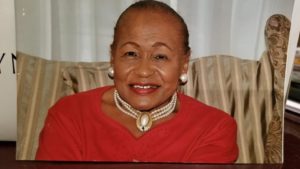
Ida Elizabeth Wesley
She was known by some as the “mother of Delray Beach.”
To others she was the founder of the Roots Cultural Festival, the namesake of a plaza on West Atlantic Avenue and a legendary retired educator who touched so many young lives.
To most people she was simply Libby.
To me, she was a guardian angel and I adored her.
Elizabeth Wesley passed away last week and I feel this loss deep in my bones.
It’s a big loss for Delray Beach because Libby was more than an icon, she was an inspiration, a visionary, a community leader and a role model.
She made her biggest impact on the youth of our community because she believed in them and that’s why her Roots Cultural Festival featured oratorical contests and other events that showcased the intellectual talents of local children. She was proud of her community and she wanted the world to see the potential that she saw in every child.
She was a big believer in education and was always teaching.
She was a big believer in community so she was always seeking ways to bring people together and strengthen Delray Beach.
Libby led with love, like all the great ones do.
Many people have their own Libby stories. And I’ve heard a few of them over the years. The common thread was that she made you feel special. Everyone felt special and loved in her presence. That’s what the great ones do, they move you and inspire you to do more, be more and love more.
Here’s my Libby story.
I got to know her when I was a reporter writing about the Roots Festival but our relationship deepened when I was elected to the city commission.
From the beginning of my term in 2000, Libby would speak of a “covenant” between city government and its citizens. I have to admit I wasn’t totally sure what she meant, but she asked the commission not to break the covenant and told us that we needed to work together to move the city forward. As a government, we shouldn’t move forward without considering the needs of the people. All of the people.
We met frequently and at every meeting I would learn something. Our meetings were often emotional—at least they were for me. I can’t say I experienced that with too many other people but something about Libby touched me very deeply. It was her depth of feeling. Her concern for others. Her insights. Her inherent goodness. It was also the way she spoke and the way she looked at you.
She was in a word: remarkable.
And I loved her very much. We all did.
I felt privileged to spend time with her. And I knew that with every meeting she would impart a lesson and I would be better for having listened.
She was close with so many of my friends—Bill Wood at the chamber of commerce, Lula Butler at the city, Joe Gillie at Old School Square.
She inspired all of us and our friends and children too.
For places to grow and for positive change to occur, they need to be shaped by people like Libby Wesley. Communities need people who are in it for the long haul and who lead with love.
We were so lucky that Libby came here from Defuniak Springs to lead and inspire us.
When I left office in 2007, Libby came to see me and she gave me the best gift ever.
It was a cassette tape of her reciting the Langston Hughes poem “Mother to Son,” a hopeful poem about not giving up. She softly sang that poem to me two years earlier after a tragic shooting took the life of a young man. The shooting challenged our community in ways I can’t begin to describe. She held my hand during those trying times and told me it was going to be OK. I guess I looked uncertain, so she said it again and I believed her.
Two years later, as I left office she signed off on the tape by telling me that she loved me like a son and that yes I had kept the covenant.
“You know that you hold a special place in my heart,” she said in a follow up email that I looked at after she passed. “That is why you were chosen to be one of my “children by love.”
She had many, but I still feel so lucky to have been one of her children. Mrs. Wesley could have had a million sons and it still would have been special.
What a gift she gave to me.
What a gift she was to Delray Beach.
Here’s the poem.
It’s beautiful.
So was Elizabeth Wesley.
Mother to Son
BY Langston Hughes
Well, son, I’ll tell you:
Life for me ain’t been no crystal stair.
It’s had tacks in it,
And splinters,
And boards torn up,
And places with no carpet on the floor—
Bare.
But all the time
I’se been a-climbin’ on,
And reachin’ landin’s,
And turnin’ corners,
And sometimes goin’ in the dark
Where there ain’t been no light.
So boy, don’t you turn back.
Don’t you set down on the steps
’Cause you finds it’s kinder hard.
Don’t you fall now—
For I’se still goin’, honey,
I’se still climbin’,
And life for me ain’t been no crystal stair.

